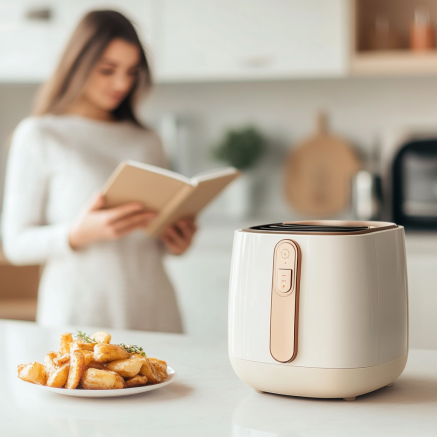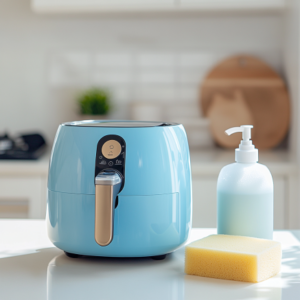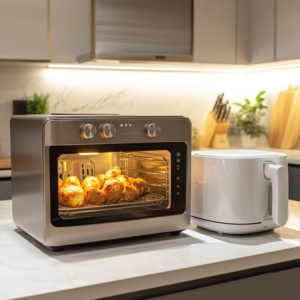Air Fryer Electricity Usage is seriously changing how I approach energy-efficient cooking.
I dug into the numbers and found that most air fryers, as of September 2024, run between 1,200 and 1,800 watts—usually about 1,500 watts per hour.
At first, I worried about the impact on my electricity bill, but here’s the twist: air fryers don’t just guzzle power—they use it efficiently.
Factors Affecting Energy Consumption
• Size of the air fryer
• Cooking temperature
• Duration of use
• Frequency of opening the basket
These all play a role in how much electricity your air fryer guzzles.
Air Fryer vs. Traditional Oven: The Energy Showdown
Now, let’s get to the juicy bit – how does an air fryer stack up against your trusty oven?
Recent studies are showing some pretty impressive results.
Air fryers are using about 50% less energy than conventional ovens for similar cooking tasks.
That’s right – half the energy!
It’s no wonder celebrity chefs like Gordon Ramsay are jumping on the air fryer bandwagon.
Energy-Saving Tips for Air Fryer Users
Want to squeeze even more efficiency out of your air fryer? I’ve got you covered.

1. Proper Sizing and Loading
Don’t go overboard with a massive air fryer if you’re cooking for one.
Match the size to your needs – it’s all about that energy-efficient cooking life.
2. Preheating Considerations
Unlike your oven, most air fryers don’t need preheating.
Skip this step and save some watts!
3. Maintenance for Optimal Efficiency
Keep that air fryer clean, folks.
A well-maintained appliance runs more efficiently, saving you energy and cash in the long run.
Cost Analysis of Air Fryer Usage
Let’s talk money – because who doesn’t love saving a few quid?
Calculating your electricity costs is easier than you might think.
Here’s a quick formula:
(Wattage × Hours Used Per Day × kWh Rate) ÷ 1000 = Daily Operating Cost
For example, if you’re using a 1500-watt air fryer for 30 minutes a day with a kWh rate of £0.15:
(1500 × 0.5 × £0.15) ÷ 1000 = £0.1125 per day
That’s less than the cost of a cuppa!
Over time, these savings can really add up, especially when compared to using your oven for every meal.
Environmental Impact of Air Fryer Use
It’s not just about the pounds and pence – we’re talking planet-saving potential here.
Reduced energy consumption means a smaller carbon footprint.
Organizations like Energy Star are taking notice, with more air fryers earning their coveted certification.
By choosing energy-efficient appliances like air fryers, we’re cooking up a storm for sustainable kitchen practices.
Air fryer electricity usage is just one piece of the energy-efficient cooking puzzle, but it’s a big one.
Expert Opinions and Recommendations
I reached out to some experts to get their take on air fryer electricity usage.
George Purton, a chef specializing in air fryer recipes, had this to say:
“Air fryers are revolutionizing how we think about energy-efficient cooking. In my experience, they not only save electricity but also time, which is invaluable in a busy kitchen.”
Even celebrity chef Emeril Lagasse has jumped on the bandwagon, launching his own line of air fryers.
He emphasizes the importance of choosing the right size for your needs to maximize energy efficiency.
Energy Star Ratings and Guidelines
The Department of Energy (DOE) and Energy Star program are taking notice of air fryers’ energy-saving potential. While there isn’t yet an Energy Star certification specifically for air fryers, the DOE recommends looking for models with:
• Automatic shut-off features
• Well-insulated bodies
• Digital controls for precise temperature management
These features can contribute to lower electricity usage and better energy efficiency.
Air Fryer vs. Microwave: A Quick Comparison
While microwaves are often touted as energy-efficient, air fryers are giving them a run for their money. Here’s a quick breakdown:
• Microwave: Uses about 1200 watts but for shorter durations
• Air Fryer: Uses 1200-1800 watts but often for slightly longer periods
The key difference? Air fryers can produce crispy textures that microwaves can’t match, often making them a more versatile choice for energy-conscious cooks.
Future Trends in Energy-Efficient Cooking
As we look ahead, the future of air fryer technology is bright. Consumer Reports predicts we’ll see:
1. Smart air fryers with Wi-Fi connectivity for optimal energy management
2. Improved insulation materials for even better energy retention
3. Hybrid appliances combining air fryer technology with other cooking methods
These advancements could lead to even lower air fryer electricity usage in the coming years.
Conclusion: The Air Fryer Revolution
So, what’s the takeaway on air fryer electricity usage?
Here’s the scoop:
• Air fryers use about 1,500 watts on average
• They’re approximately 50% more energy-efficient than traditional ovens
• With proper use, they can lead to significant energy and cost savings
As we continue to seek out more sustainable and energy-efficient cooking methods, air fryers are proving to be a valuable tool in our kitchen arsenal.
Whether you’re a culinary pro like Gordon Ramsay or a home cook looking to save on your energy bills, understanding air fryer electricity usage can help you make informed decisions about your cooking habits.
Discover the Best Vegetarian Air Fryer Cookbook UK and enjoy a variety of mouthwatering, easy-to-make recipes that fit perfectly into your healthy lifestyle! Plus, don’t forget to check out our recently published articles for more tips, reviews, and air fryer inspiration.









